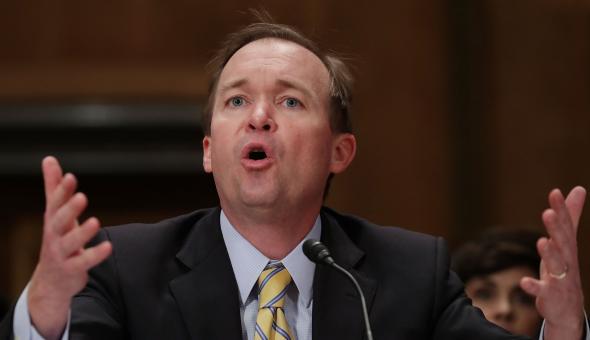Rep. Mick Mulvaney, Trump’s nominee for director of Office of Management and Budget, has a history of taking a hard line against government employees and publics servants who don’t pay their taxes. During his time in the South Carolina legislature and in Congress, the Republican has supported four different pieces of legislation prohibiting anyone on the government’s payroll from doing their jobs if they had outstanding tax debts or liens.
One would think that, given his commitment to this cause, Mulvaney would be awash in shame and contrition for the recent discovery that he owes $15,000 in unpaid taxes for a nanny he and his wife hired to help take care of their triplets between 2000 and 2004. Nah. Instead, he’s writing the situation off to what he appears to consider a minor and forgivable blind spot: not valuing care work as real work. This is a worldview with misogynistic and racist roots, and it shouldn’t be easily forgiven.
Here’s his defense from Tuesday’s confirmation hearing:
In 2000, we had triplets. When they came home, we hired someone to help my wife take care of the children. In our minds, she was a babysitter. She did not live with us. She did not spend the night there. She did not cook. She did not clean. She did not educate the children; she helped my wife with the kids.
You hear that? She just helped take care of three newborns who eventually became three infants and then three toddlers. Who could blame him for overlooking such under-the-radar, easy-peasy work when figuring out who to treat like a legitimate employee come tax season? It’s not like she made them a pot roast or taught their kids algebra, for heaven’s sake. And, so confusingly, every evening she would leave her job and then, get this, return the next morning. Also, best to ignore the fact that his owing that much money in taxes suggests she was paid a decent salary—possibly somewhere in the $60,000 range, according to this nanny tax calculator—and therefore was likely a regular fixture around his home during the workweek.
Of course, there’s the slightest possibility that this whoopsy-daisy shtick is a sham and that Mulvaney, who was reportedly worth $6.8 million in 2009, was just gunning for ways to save a few shells on his IRS bill. But given his devotion to tax-related causes, this seems unlikely. Either way, the fact that he sees “she was a babysitter” as an acceptable explanation, honest or manufactured, is no good.
Debates surrounding public servants’ failure to pay their household employees on the books often revolve around the character of the people in question. Unfortunately, we rarely hear about the way under-the-table compensation damages employees as individuals and degrades their profession. A nanny, or any other type of domestic worker, paid under the table is ineligible for Social Security, unemployment insurance, and Medicare benefits. They’re also denied an official employment history, which could make it harder for them to get loans, credit, or a mortgage, or to find another job. An unofficial status makes them less able to seek recourse for workplace harassment or mistreatment, as well.
“It’s all part of this dynamic that makes domestic work like working in the Wild West,” Ai-Jen Poo, director of the National Domestic Workers Alliance and co-director of Caring Across Generations, told Slate. “There are no rules, no standards; everything is happening in the shadows and it breeds shadow behavior. Workers are forced to do their jobs living with the vulnerability that working in the shadows creates.”
Poo pointed out that a line can be drawn between Mulvaney’s easy dismissal of child care work and the creation of the then-radical National Labor Relations Act in 1935, which Southern members of Congress refused to sign on to unless farmworkers and domestic workers were excluded from coverage. “This is part of a legacy of misogyny and racism and, to this day, we are still fighting for them to be included. Care work is one of the most quickly growing sectors, and yet we continue to live in this alternative universe where this work isn’t valued,” Poo says.
To be fair, I know many well-meaning, pro-immigrant, pro-women families who feel that they can’t afford to pay their nannies on the books. (Mulvaney’s personal wealth, along with his overall belief system, suggests he does not fall into this camp.) Through reporting and personal encounters, I’ve also met many nannies who, for reasons of a lack of documentation or personal finances, prefer it that way. These are understandable positions to take, considering the high financial burden child care places on families and the low compensation many who do this work must budget their lives around. Still, it’s not a long-term solution.
What would work is making sure everyone has access to affordable and high-quality child care. We need legislation to make this happen, but before that can happen we need those in charge to view care work as legitimate labor. Mulvaney’s actions and words make it clear that he—the man Trump wants to put in charge of developing and implementing his budget and advancing or impeding federal regulations—does not. This should be grounds for Congress to vote against his nomination. Sadly, it probably won’t.
